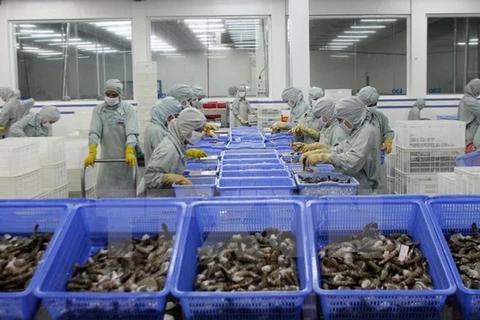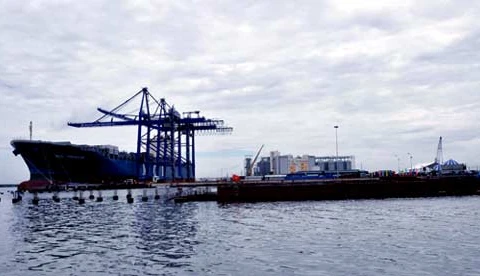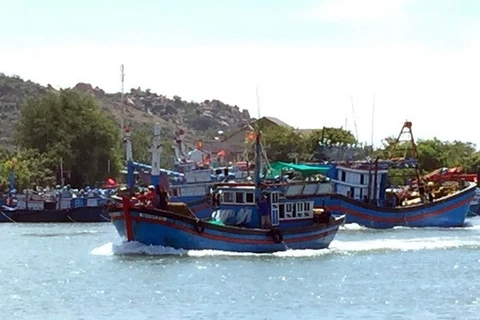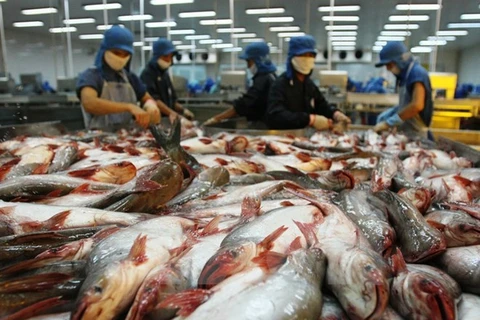HCM City (VNA) – Seafood processing companies are lacking materials for production, forcing some of them to import materials to meet orders.
Tran Ngoc Tuoi, Director of Vinh Thuan Sai Gon Aquatic Products Ltd company, said the firm now lacks 70 – 80 percent of materials compared to 30 – 40 percent in the first three months in the past. His company had to invite its French partner to Vietnam to understand the situation.
Some businesses had to import materials from Taiwan (China), Indonesia, Thailand for processing, but as a majority of customers prefer seafood caught in Vietnamese waters, other exporters have to refuse orders.
One of the main reasons for the shortage is the fishing season, but it is also alarming that near-shore seafood resources have been depleted, said Vice Chairwoman of the Vietnam Association of Seafood Exporters and Processors Nguyen Thi Thu Sac.
Another problem is the dominance of private traders in the market of raw seafood materials, which resulted in a paradox that local raw aquatic materials are exported while processors do not have sufficient materials.
Nevertheless, aquatic product export this year has seen good growth except for shipments to the European Union market due to the yellow card warning on illegal, unreported and unregulated (IUU) fishing.
Excluding sea fish and crab, the shipments of cuttlefish-octopus and tuna to the EU fell by 20 percent and 4 percent, respectively in the first four months of this year.
According to the VASEP, Vietnamese businesses are working to increase tuna export to the EU. Most tuna processors use imported materials, thus making it easier for them to complete sets of records as required by the EU.
In addition, the EU still offers tax waive to 25,000 tonnes of steamed tuna fillets from third countries without trade agreements with the EU such as Thailand, Vietnam and China, affording Vietnamese firms a chance to tap export opportunities.
According to VASEP’s Thu Sac, during a fact-finding trip in May, a delegation from the European Commission’s (EC) Directorate-General for Maritime Affairs and Fisheries (DG-MARE) acknowledged efforts of the Vietnamese government and business community to fight IUU fishing.
In January 2019, the DG-MARE will return to Vietnam to review the country’s efforts in the regard.
VASEP asked the Ministry of Agriculture and Rural Development to direct provincial authorities support fishing ports in the verification of origin of seafood.
It also called on the State to invest more in fishing ports, fishing logistics facilities and the national database on fishing, towards lifting Vietnam out of yellow warning status and developing the fishing industry in a sustainable manner in the near future.-VNA
Tran Ngoc Tuoi, Director of Vinh Thuan Sai Gon Aquatic Products Ltd company, said the firm now lacks 70 – 80 percent of materials compared to 30 – 40 percent in the first three months in the past. His company had to invite its French partner to Vietnam to understand the situation.
Some businesses had to import materials from Taiwan (China), Indonesia, Thailand for processing, but as a majority of customers prefer seafood caught in Vietnamese waters, other exporters have to refuse orders.
One of the main reasons for the shortage is the fishing season, but it is also alarming that near-shore seafood resources have been depleted, said Vice Chairwoman of the Vietnam Association of Seafood Exporters and Processors Nguyen Thi Thu Sac.
Another problem is the dominance of private traders in the market of raw seafood materials, which resulted in a paradox that local raw aquatic materials are exported while processors do not have sufficient materials.
Nevertheless, aquatic product export this year has seen good growth except for shipments to the European Union market due to the yellow card warning on illegal, unreported and unregulated (IUU) fishing.
Excluding sea fish and crab, the shipments of cuttlefish-octopus and tuna to the EU fell by 20 percent and 4 percent, respectively in the first four months of this year.
According to the VASEP, Vietnamese businesses are working to increase tuna export to the EU. Most tuna processors use imported materials, thus making it easier for them to complete sets of records as required by the EU.
In addition, the EU still offers tax waive to 25,000 tonnes of steamed tuna fillets from third countries without trade agreements with the EU such as Thailand, Vietnam and China, affording Vietnamese firms a chance to tap export opportunities.
According to VASEP’s Thu Sac, during a fact-finding trip in May, a delegation from the European Commission’s (EC) Directorate-General for Maritime Affairs and Fisheries (DG-MARE) acknowledged efforts of the Vietnamese government and business community to fight IUU fishing.
In January 2019, the DG-MARE will return to Vietnam to review the country’s efforts in the regard.
VASEP asked the Ministry of Agriculture and Rural Development to direct provincial authorities support fishing ports in the verification of origin of seafood.
It also called on the State to invest more in fishing ports, fishing logistics facilities and the national database on fishing, towards lifting Vietnam out of yellow warning status and developing the fishing industry in a sustainable manner in the near future.-VNA
source
























